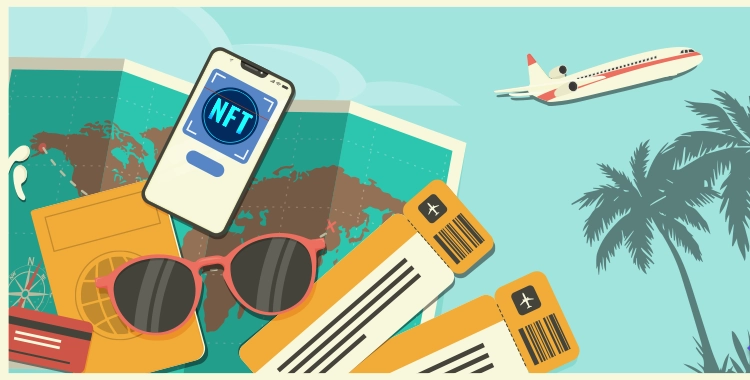
The advent of non-fungible tokens (NFTs) has brought about a significant transformation in the technological sphere. These unique and verifiable tokens have opened up new possibilities within the travel industry in the Web3 landscape. From ticketing to personalized travel experiences, NFTs are reshaping the way we embark on global adventures. Join us as we explore the profound impact of NFTs on the future of travel in this digital revolution.
The travel and tourism sector encompasses the facilitation of people's journeys to different destinations, whether for business or leisure purposes. Brands within this industry play a vital role in ensuring smooth transportation and organizing activities at the chosen locations. This industry encompasses various sectors, including tourism, hospitality, and guided exploration of iconic landmarks, fine dining establishments, luxury hotels, as well as ecological and conservation parks. However, the full potential and effectiveness of this industry can be significantly amplified through the integration of non-fungible tokens (NFTs).
But how exactly?
As decentralized digital tokens, NFTs possess the capability to revolutionize the travel and tourism industry across multiple fronts. Their integration has the potential to redefine the industry, address operational challenges, and unlock new economic opportunities. Here are several ways in which NFTs can drive innovation and advancement in the travel and tourism sector.
In contrast to online reservations, offline bookings can often be stressful, presenting challenges during peak travel periods. Travelers frequently encounter delays or find themselves stranded due to inefficiencies caused by system downtime or congestion. To ensure a smooth and hassle-free booking and travel experience, an innovative solution emerges: the creation of airline tickets as Non-Fungible Tokens (NFTs) and their availability to passengers.
By associating each NFT with a specific seat, the rarity of the ticket can be determined based on the class, encompassing business, economy, premium economy, and first class. This groundbreaking approach revolutionizes the process of booking airline tickets, offering a seamless and adaptable experience. Travelers gain the ability to sell or transfer their NFT tickets in the event that their travel plans change. Notably, prominent brands that have embraced this initiative include:
Travala, a blockchain-based online travel agency, provides a platform for crypto enthusiasts to book flights with over 600 airlines using cryptocurrency as payment. The company made its entry into the NFT realm with the introduction of Travel Tiger NFTs, which are built on the Ethereum network. This NFT collection comprises 1,000 utility NFTs that offer exclusive benefits such as access to luxurious getaways in the Maldives, a VIP experience at the Singapore Grand Prix, a journey to Desroches Island in Seychelles, and much more. Recently, Travala conducted the Seychelles Travel Drop draw, granting one lucky smart diamond member eight travel packages, including flights worth $3,000 for two adults, a rejuvenating Sunrise Yoga session, a delightful Beach picnic, and other exciting experiences. According to an official report, the draw concluded on April 4, 2023, and the travel dates are scheduled between May 10 and December 20, 2023.
Flybondi, an affordable airline based in Argentina, has introduced a unique approach to flight ticketing by utilizing NFTs. In collaboration with TravelX, Flybondi launched its Ticket 3.0 program in March 2023. This innovative initiative involves the creation of an NFT for every flight ticket issued to passengers. Built on the Algorand network, the Ticket 3.0 NFTs offer flexibility and utility, enabling passengers to freely sell or transfer their NFTickets and even modify the ticket holder's name.
Other reputable brands using this initiative include:
NFTs can also play a role in the realm of hotel and restaurant reservations. They offer a convenient means to secure bookings in advance, allowing individuals to sell their reservations if unforeseen circumstances arise. Esteemed brands that have embraced this concept include:
As the world increasingly embraces digital communities and blockchain technology, renowned travel brands have the opportunity to amplify their digital presence and reach a broader audience through promotional activities. The perfect tool to achieve this groundbreaking exposure is through the use of NFTs, which can captivate millions of potential customers.
Similar to coupons and promotional codes, this innovative approach involves creating utility NFTs that provide discounted services to prospective travelers and tourists. Holders of these NFTs gain access to premium experiences while enjoying cost savings. This initiative aims to cultivate customer loyalty and establish brand recognition through the use of NFTs. Notable brands that have embraced this concept include:
Just like companies and organizations offer shares to generate funding and increase profitability, airline companies can adopt a similar approach by selling shares in the form of NFTs to interested shareholders. These NFTs can represent a fractional ownership or a single NFT symbolizing the shareholder's stake in the company. Notably, this fundraising initiative can extend beyond airlines and encompass restaurants, hotels, cafes, parks, and other tourist destinations. By leveraging NFTs that symbolize shareholding, tourists will feel a stronger connection to the local community of their chosen destinations.
The thriving NFT ecosystem continues to drive numerous corporate enterprises with its enduring capabilities. Distinguished brands in the travel and tour industry are actively embracing diverse NFT initiatives to advance their businesses and boost revenues. This trend indicates a growing likelihood of more brands joining the travel NFT movement and leading a transformative Web3 revolution within the industry.
0 replies on “The Potential of NFTs to Revolutionize the Travel Industry”